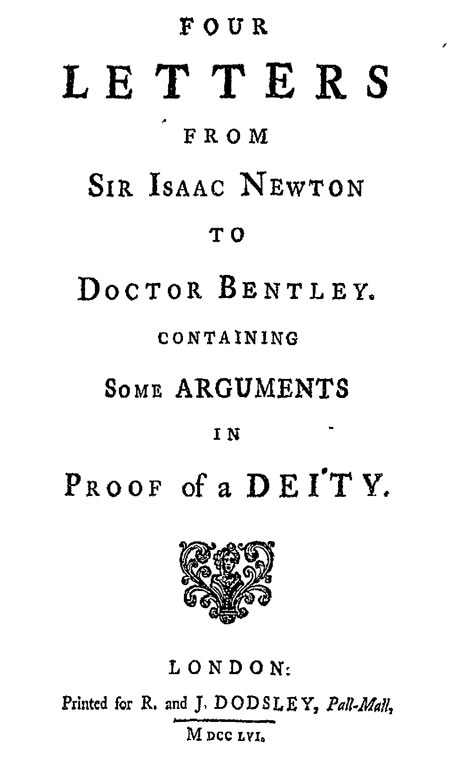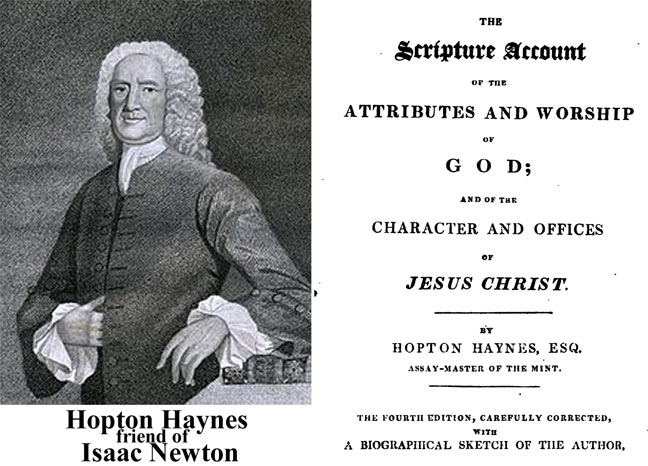









































|
Click Here to View an Article Written by Hopton Hayes who worked with Issac Newton

Isaac Newton & the Trinity
Isaac Newton was an English physicist, mathematician, astronomer, natural philosopher and alchemist, regarded by many as the greatest figure in the history of science. In optics, he invented the reflecting telescope and argued that light is composed of particles. In mathematics, Newton shares the credit with Gottfried Leibniz for the development of calculus. Newton’s laws of motion and universal gravitation are taught in every physics classroom. He said, “Gravity explains the motions of the planets, but it cannot explain who set the planets in motion. Yahweh governs all things and knows all that is or can be done.” His scientific fame notwithstanding, Newton’s study of the Bible and of the early Church Fathers was among his greatest passions. One Church doctrine Newton would not accept was the doctrine of the Trinity. In England, denying the doctrine of the blessed Trinity was a criminal offense punishable by imprisonment.
Isaac Newton (1643-1727) wrote more on the Bible than he did on natural science; two and one-half million words. He said, “I have a fundamental belief in the Bible as the Word of Yahweh, written by those who were inspired. I study the Bible daily.” Newton tested and investigated the Words of Yahweh with the scientific method of observing, hypothesizing, and testing. To Newton, his scientific and religious experiments were one and the same, observing and understanding how the world functioned. Newton saw Yahweh as the Master Creator, whose existence could not be denied in the face of the grandeur of all creation. “He being a fellow of the college named Trinity, turned to Christian theology with the same sleepless fervor he brought to alchemy. He started a notebook, writing Latin headings atop the folios: Life of Christ; Miracles of Christ;
The chemistry of the Middle Ages and the 16th century. OED
When Isaac Newton and John Locke speak of God, they are referring to the God of Israel, who is Yahweh. In their quotes, I will replace the word God with the actual name of that God, which is Yahweh.
Tiner, J.H. (1975). Isaac Newton: Inventor, Scientist and Teacher. Milford, Michigan, U.S.: Mott Media.
http://www.newtonproject.sussex.ac.uk/prism.php?id=43
Passion, Descent, and Resurrection…The topics that most absorbed his interest were the relation of Yahweh and Christ, the Father and the Son, and most of all, De Trinitate, Of the Trinity. Here he swerved into what the Church would call heresy. He abjured this central dogma being taught by the Church: three persons in one Godhead, holy and undivided. He denied the divinity of Yahoshua and of the Holy Spirit.”
|
|
|
Newton’s Religious Life and Work
by Robert Iliffe (2013)
(Rob Iliffe is Professor of History at the University of Oxford. He is the General Editor of the online Newton Project and the author of Priest of Nature:The Religious Worlds of Isaac Newton.)
Isaac Newton (1642–1727) was born soon after the English civil wars had begun, and in the first two decades of his life he was exposed to deeply conflicting religious traditions. His local church of Colsterworth had a puritan minister intruded by the parliamentarian authorities in the late 1640s, and in the second half of the 1650s he lodged with William Clarke, one of the most powerful parliamentarian figures in Grantham. Nevertheless, although he had close contact with puritan groups, the senior and most influential male figures in his life were ordained members of the Church of England. His own father died a few months before he was born, and when he was three his mother married Barnabas Smith, the ageing rector of the neighbouring village of North Witham. William Aiscough, his maternal uncle and a Trinity College graduate, was rector of Burton Coggles, a village 5 miles east of Newton’s home, Woolsthorpe Manor. His mother spent the vast majority of her time at Smith’s rectory between 1645 and 1653, producing the three half-siblings who would be Newton’s closest relatives after she died in 1679. In 1661, her best friend’s brother, Humphrey Babington, recently reinstituted as a fellow at Trinity, was made rector of Boothby Pagnell, which was just over six miles away. Although the barest facts of their relationship are known, Newton was close to Babington in his early years at the college and the latter almost certainly acted as a patron during this period. At the same time, Newton came to know Isaac Barrow, the first Lucasian Professor and later master of the college. In 1669 Barrow would pave the way for Newton to follow him as Lucasian professor, on the grounds that he himself had a more serious calling as a divine.
At some point early in his career at Trinity College, Newton undertook an extraordinary programme of creative theological research, whose expansiveness, originality and radicalism was matched by only a handful of contemporaries. This programme of study was predominant and unrelenting, being occasionally interrupted by his work in alchemy, mathematics and natural philosophy. At some point in the 1670s Newton came to the view that a simple and authentic form of Christianity had been perverted by corrupters in the centuries following the life of Jesus Christ, producing the brand of religion that was now accepted as orthodox by the Roman Catholic Church and to some extent, by the Church of England. He concluded that the orthodox notion of the Trinity was a fiction that was invented in the early fourth century and subsequently promoted by servants of the devil. He came to believe that it was a form of idolatry to give to any other being the worship that was properly due to God, and that Jesus was divine but was not God.
(Read the PDF file for the entire article.)
|
Isaac Newton by James Gleick; pg. 107 |
|
|
|

|

Click to Read The PDF Article
Hopton Haynes was born about 1672. Haynes entered the service of the Mint as weigher and teller in 1696 or early in 1697, almost at the same time as Isaac Newton's's appointment as Warden. He was promoted to be assay-master in 1723. Haynes was close to Newton, who died in 1727. He was enployed to translate into Latin the two Letters of Sir Isaac Newton on the true reading of 1 John 5:7-8 and 1 Timothy 3:16. It was through Haynes that William Whiston, in 1712, communicated with Newton on the subject of baptism. Richard Baron described Haynes as a Unitarian.
|
|

